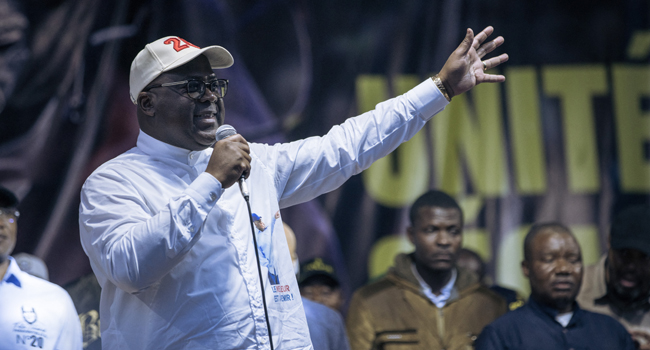DR Congo’s President Felix Tshisekedi has won a second term in office with a landslide victory, according to provisional results announced Sunday, in a vote opposition leaders have dismissed as a “sham”.
Provisional results from the single-round presidential ballot, declared by the country’s electoral commission Ceni, showed that Tshisekedi had won 73 percent of the vote.
Flanked by his wife Denise and his mother, the president appeared on a balcony at his campaign headquarters in the capital Kinshasa to address supporters after the release of the results.
“I have been re-elected president of all Congolese,” Tshisekedi, who was dressed in a white shirt and cap, told cheering supporters. “It’s in this spirit of openness that I will exercise this second mandate”.
Moise Katumbi — a wealthy businessman, football club owner and former provincial governor — was the election runner-up with about 18 percent.
The Democratic Republic of Congo’s Constitutional Court is expected to confirm the provisional results on January 10.
Tshisekedi, 60, first came to power in January 2019 after a disputed election that many observers said he had in fact lost.
Martin Fayulu — who says he was robbed of the last presidential election in 2018 — also contested this year’s poll but in the end won about five percent of the votes.
The 20 remaining candidates, including Denis Mukwege, who won a Nobel Peace Prize for his work with female victims of wartime sexual violence, were either under, or hovering around, one percent.
Nine opposition candidates — Mukwege, Fayulu and Katumbi — on Sunday signed a declaration rejecting what they termed a “sham” election and called for a re-run.
Fayulu, addressing reporters in the capital Kinshasa the same day, said the results “are a masquerade. This must not be accepted”.
Tresor Kibangula, a political analyst at the Ebuteli research institute who spoke to AFP before the full provisional results were released, said Tshisekedi’s vote tally “is way beyond all expectations”.
“His dynamic campaign worked” but his scores in some regions “raise questions about the impact of the irregularities that were observed”.







